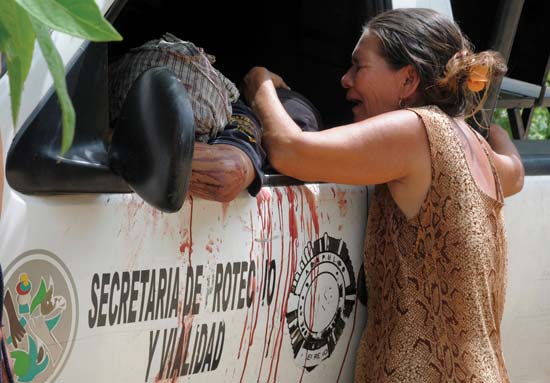A month ago, an article was posted on Hillary Clinton’s campaign website with the title: 7 things Hillary Clinton has in common with your abuela. The subtitle: She isn’t afraid to talk about the importance of el respeto. It continues: “She’s always happy to talk about her ‘beautiful, perfect’ granddaughter, she’s an eager volunteer for babysitting duty, and whenever she travels around the country, she makes sure to bring back a gift for Charlotte—sound familiar?”
Well, yes: it sounds like grandmothers of all times, races and ethnicities, including my own nonna (If the article had been “7 things Hillary Clinton has in common with your nonna, boy would I have been seeing red). What does it have to do with Latin grandmothers specifically? Nothing. There’s nothing in the article – unless a picture of Hillary with singer Marc Anthony at the end counts – that shows any awareness of (or senstivity to) Latin culture whatsoever besides a few, clumsily-placed token words in Spanish. This is a perfect example of Hispandering, a term defined by Shereen Marisol Meraji as “faking interest in Hispanic issues and culture for self-serving reasons”.

Photo: hillaryclinton.com
The social-media blowback against the piece was immediate, boosting the hashtag #NotMyAbuela into a trending topic. “Our experiences cannot be equated to those of a rich and privileged white woman. It’s shameful and disrespectful to try,” said one tweet. “Hillary is #NotMyAbuela because I was separated by mine by many miles, and a militarized border,” said another. Others took issue with her record as Secretary of State: “#NotMyAbuela does not support war/dronings which disproportionatly kill children;” “#NotMyAbuela because no one in my family ever overthrew (or tried to) democratically elected leaders in Honduras, Haiti, or Ecuador;” “Hillary tries outreach to latinos but doesn’t think they remember Bill’s NAFTA that made latinos economic refugees. #NotMyAbuela.”
And this, ultimately, is the point. On one level, the “Abuela” piece is simply a more cringeworthy example of what has been a remarkably tone-deaf campaign (in the same vein as dispatching Chelsea Clinton to New Hampshire to insist that Bernie Sanders wants to dimsmantle Medicare). But something more sinister is at work here. In 2009, I sat glued to the television as deposed Honduran president Manuel Zelaya circled the Tegucigalpa airport in a plane, trying to land. Zelaya had been removed for attempting to hold a non-binding poll on holding a constituent assembly to rewrite the constitution. In her role in supporting this coup d’état, Hillary has been remarkably frank: “In the subsequent days [after the coup] I spoke with my counterparts around the hemisphere, including Secretary [Patricia] Espinosa in Mexico,” she writes in her book Hard Choices. “We strategized on a plan to restore order in Honduras and ensure that free and fair elections could be held quickly and legitimately, which would render the question of Zelaya moot.” The winner of those ‘free and fair’ elections, Porfirio Lobo, “diminished [the] rule of law,” “tightened the noose on freedom of speech, assembly and association,” and “rewarded coup loyalists with top ministries,” according to an article by Honduran scholar Dana Frank in Foreign Affairs. Since 2011, Honduras now holds the title of murder capital of the world, with 169 homicides per 100,000 people.

Photo: Los Angeles Times
As for Mexico, where I live, then-Secretary of State Clinton affirmed that there was “no alternative” to carrying on with the U.S.-backed drug war that has killed some 100,000 people killed since 2006. “It is messy. It causes lots of terrible things to be on the news,” she said in 2011. I suppose “messy” is one way to describe it. Under the Mérida Initiative, the United States has funneled some $2.3 billion dollars to the Mexican government, thus underwriting governments that have shown no compunction in committing severe human rights abuses. As a recent article in Human Rights Watch puts it:
Since former President Felipe Calderón began a “war on drugs” in 2007, Mexican security forces have engaged in egregious violations, including torture, extrajudicial executions, and enforced disappearances. Human Rights Watch has documented such abuses by security forces throughout the country, including 149 cases of enforced disappearances. United Nations human rights monitors have found that torture is a “generalized” practice in the country, and that extrajudicial executions by security forces have been “widespread.”
Furthermore, through the release of State Department emails and Wikileaks cables, we now know that Clinton’s State Department worked behind the scenes to break up PEMEX, Mexico’s state-owned oil and gas company, thus paving the way for the privatization of the nation’s oil and gas industry. And not only that, but two of her former collaborators at State, David Goldwyn and former ambassador to Mexico Carlos Pascual, now stand to profit from the oil privatization in the private sector, Goldwyn as counsel for the law firm Sutherland, Asbill & Brennan and their clients in the energy industry, and Pascual as Senior Vice President of Energy Affairs at the for-profit consultancy IHS Inc.

Photo: Britannica.com
Let’s be fair: all candidates pander for votes, and no one person can be expected to be an expert on the intricacies of every culture represented within their borders. The Hispanic world, moreover, is a vibrant, diverse set of cultures spreading over several continents, hundreds of languages, and over 25 countries. But what is particularly galling about Hillary’s hispandering is the glaring disconnect between her rhetoric and her record, which includes decisions that have had a direct bearing on the very people her campaign is now pandering to. That’s not something my nonna would have done.
Very perceptive comments, Kurt. Gil
Hashtag Thumbs up